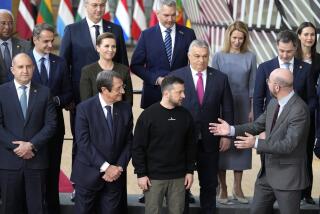EU Summit Founders on Budget Clash
- Share via
BRUSSELS — The leaders of 25 European countries failed Friday to agree on how to spend billions of dollars in the European Union’s budget, dealing a final, devastating blow to a troubled summit and clouding the future of the continental alliance.
The summit deadlocked in bitter dispute over subsidies, rebates and financial aid. An afternoon of arm-twisting by senior European Union officials did little to persuade countries to, in the words of German Chancellor Gerhard Schroeder, make a sacrifice and forge a compromise.
“Europe is not in a state of crisis, it is in a state of profound crisis,” said Jean-Claude Juncker, the prime minister of Luxembourg, whose country, as rotating president of the EU, chaired the summit.
At a news conference early today, Juncker described a negotiation “in millimeters.” Seemingly every country raised objections to the 2007-2013 budget, reflecting divisions over whether the alliance should be an integrated political entity or simply a free-trade zone.
“I’m sad and ashamed, to a certain extent,” Juncker said, condemning countries for a lack of political will and lamenting that poorer nations seemed more willing to sacrifice than their richer partners. “In a way, we go back to square one.”
Reaching agreement on the budget, worth $120 billion a year, was seen as an important test of the EU’s ability to show that its members can still work together -- that there is unity in the union -- after major political setbacks in recent weeks.
Voters in France and the Netherlands soundly rejected the union’s constitution, an elaborate document meant to streamline the EU’s decision-making system and consolidate its influence on the world stage. Instead, the leaders found themselves forced on the first day of their summit to abandon the goal of continent-wide approval of the 300-page document by 2006.
With the constitution in effect shelved, Europe’s prime ministers and key EU officials struggled to achieve an accord on the budget. But it was not to happen.
Failure to agree on a budget does not mean the EU screeches to a halt. It can operate on the 2006 budget and, in theory, continue afterward on a program of year-to-year spending.
However, planning and longer-term projects, including the building of roads and other infrastructure, becomes impossible.
The most acrimonious point of contention involved Britain and France.
All of the countries represented here opposed British Prime Minister Tony Blair’s insistence on clinging to the rebate his country receives. Under an agreement reached two decades ago, when Britain was a poorer partner, the EU refunds to London an amount now worth nearly $6 billion a year.
Blair said he would consider reducing the rebate only if agricultural subsidies, which account for nearly half of the EU budget and benefit France disproportionately, were overhauled.
French President Jacques Chirac refused to consider the suggestion, and on this point the talks collapsed.
Cutting the rebate “should in no case be conditioned on the revision of farm spending,” Chirac told his colleagues, according to a transcript circulated by the French delegation.
The London-Paris battle, however, was not the only one.
Spain and Italy objected to proposals by the EU executive committee to redirect funds designated for their impoverished southern regions to poor, mostly former East Bloc countries that joined the EU in May 2004.
And wealthy countries such as Sweden and the Netherlands, the highest per-capita contributor to the EU budget, demanded that their tithes be reduced. Other countries disagreed on the size of caps that should be put on EU spending.
“We simply weren’t able to bring people together sufficiently,” said European Commission President Jose Manuel Barroso, speaking at the news conference with Juncker.
Added Juncker: “I have to say, my enthusiasm for Europe has suffered a serious setback today.”
More to Read
Sign up for Essential California
The most important California stories and recommendations in your inbox every morning.
You may occasionally receive promotional content from the Los Angeles Times.














